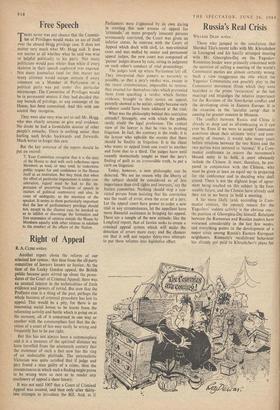Free Speech
Fr HERE never was any chance that the Commit- ' tee of Privileges would make an ass of itself over the absurd Hogg privilege case. It does not matter very much what Mr. Hogg said. It does not matter at all whether what he said was wise or helpful politically to his party. Not many politicians would pass whiter than white if every skeleton in their speech cupboard was exposed. Not many journalists (and for that matter not many citizens) would escape censure if every comment on a Member of Parliament or a political party was put under this particular microscope. The Committee of Privileges would be in permanent session if they had decided that any breach of privilege, or any contempt of the House, has been committed. And this with one accord they recognise.
They were also very wise not to call Mr. Hogg, who was clearly anxious to give oral evidence. No doubt he had a formidable dossier ,of other people's remarks. There is nothing easier than hurling such bricks backwards and forwards. Much better to forget this case.
But the key sentence of the report should be put on record:
7. Your Committee recognise that it is the duty of the House to deal with such reflections upon Members as tend, or may tend, to undermine public respect for and confidence in the House itself as an institution. But they think that when the effect of particular imputations is under con- sideration, regard must be had to the im- portance of preserving freedom of speech in matters of political controversy and also, in cases of ambiguity, to the intention of the speaker. It seems to them particularly important that the law of parliamentary privilege should not, except in the clearest case, be invoked so as to inhibit or discourage the formation and free expression of opinion outside the House by Members equally with other citizens in relation to the conduct of the affairs of the Nation.


































 Previous page
Previous page